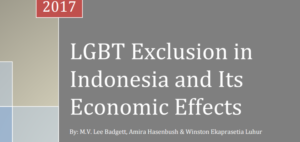 Discrimination against lesbian, gay, bisexual, and transgender (LGBT) Indonesians in workplaces, schools, and social opportunities is pervasive and will limit their ability to fully contribute to the Indonesian economy. A new study shows that the cost of discrimination to the Indonesian economy could range from nearly 900 million to 12 billion US dollars.
Discrimination against lesbian, gay, bisexual, and transgender (LGBT) Indonesians in workplaces, schools, and social opportunities is pervasive and will limit their ability to fully contribute to the Indonesian economy. A new study shows that the cost of discrimination to the Indonesian economy could range from nearly 900 million to 12 billion US dollars.
In LGBT Exclusion in Indonesia and Its Economic Effects, researchers M.V. Lee Badgett, Amira Hasenbush, and Winston Ekaprasetia Luhur examine the evidence that discrimination occurs against LGBT people, and the study shows how that treatment can hold back economic growth in Indonesia.
Key findings from the report include:
- Waria (an Indonesian term for transgender women and effeminate men) face many barriers because they violate cultural rules about gender. Waria are often unable to get work, stay in school, or open a bank account because the gender listed on their identification cards does not match their gender presentation.
- LGBT people and those perceived as LGBT report high levels of harassment in school, which may reduce educational attainment and reduce economic productivity later in life.
- In some regions, LGBT people rely heavily on work in the informal employment sector, particularly sex work and jobs in salons.
- Studies of LGBT Indonesians show that most have experienced violence, resulting in increased economic burdens.
- Stress associated with prejudice produces higher rates of depression and suicide, impairing economic productivity.
M.V. Lee Badgett, an economist who has conducted similar studies in other parts of the world, notes, “To reach their full economic potential, LGBT people need to develop their human capital, or their abilities, skills, and knowledge. This report shows that LGBT Indonesians are often held back from reaching that point, which prevents them from contributing fully to the economy.”
Badgett compares the Indonesian economy to that of India where similar research has been completed. “The data in Indonesia is somewhat limited,” Badgett said. “If we draw on research from India, we would estimate that the loss resulting from LGBT exclusion in Indonesia would be from 0.1 percent to 1.4 percent of gross domestic product (GDP), or $862 million to $12 billion.” The report shows that public attitudes in Indonesia are far less accepting of homosexuality than attitudes in India, so this estimate of Indonesia’s estimated financial loss is considered conservative.
The findings of LGBT Exclusion in Indonesia and Its Economic Effects rely on an extensive review of peer-reviewed literature as well as documentation from governments, intergovernmental organizations, and non-government organizations.
The Williams Institute, a think tank on sexual orientation and gender identity law and public policy, is dedicated to conducting rigorous, independent research with real-world relevance.








